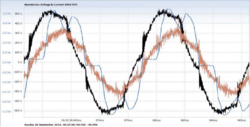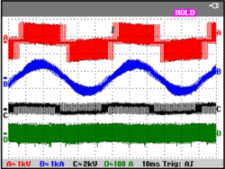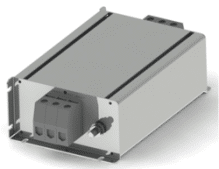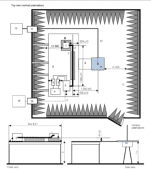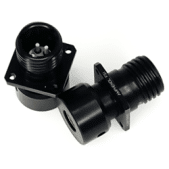In Part 2 of this blog, the harmonic current distortion of a typical Variable Frequency Drive (VFD) is discussed, as well the possible solutions to the problems that this causes. Active Front End or (AFE) units are also discussed and some of the issues that they themselves … [Read more...]
Comparison of PWM VFDs versus Resonant Link Converters – Part 1
AC variable frequency drives (VFDs) have been in existence in a number of forms since the early 1970s. In the early 1980s the “pulse width modulated” (PMW) VFD versions began to appear. This form of motor control produced less motor rotor and stator harmonic heating and delivered smoother torque control at slow motor speeds. Thirty years on PWM VFDs are still the most … [Read more...]
Insertion Loss and Filter Performance
Background Filters are almost always a part of electronics design. Design engineers design a filter to achieve certain attenuation in specified frequency range. There are many types of filters, such as high pass, low pass or bandwidth. Popular filter configurations include L-C, C-L-C (π) or L-C- L (T). It is safe to say that when it comes to filter design, the discussion of … [Read more...]
Design Characteristics and Verification of Chambers for Testing to CISPR 25
This article is intended to provide an understanding of the requirements for qualification of an Absorber Lined Shielded Enclosure (ALSE) for use in the measurement of radiated disturbances in the frequency range of 150 kHz to 2,500 MHz, as described in CISPR 25. Who is CISPR In order to provide the technical parameters for verification of these compliance test sites, it … [Read more...]
Interstate Connecting Components (ICC) Introduces BHA PTFE-Plated M28876 Connectors from Amphenol Fiber Systems
Interstate Connecting Components, a division of Heilind Mil-Aero and leading distributor of military-aerospace connectors and accessories, is now offering M28876 circular fiber optic connectors with black hard anodized (BHA) PTFE (polytetrafluoroethylene) plating. The connectors are precision-engineered by Amphenol Fiber Systems International, a leading manufacturer of fiber … [Read more...]
TMD USA Wins Major Defense Contract For Traveling Wave Tube Amplifiers in A Mission-Critical Surveillance Role
Now part of Communications & Power Industries (CPI)) has won a large defense contract for traveling wave tube amplifiers (TWTAs) for use in a radar unmanned aerial vehicle program. Valued in excess of $2.5 million, the contract was awarded by a prime contractor under the terms of a competitive bid. Said Tom Curtin, vice president, sales and business development, TMD … [Read more...]
Orbel, Niche Designer and Manufacturer of Light-Gauge Metal Components and Assemblies, Serves Critical-Mission Applications from Fighter Jets to Self-Driving Cars for 60 Years and Counting
By combining hard work with ingenuity over three generations, Orbel, maker of custom light-gauge metal components and assemblies, quietly contributes to progress around the world. From precision parts for U.S. fighter jets to electric cars and tomorrow’s self-driving cars, this three-generation family business has grown from a man-in-a-garage operation started … [Read more...]
HARTING Names Heilind Electronics 2020 North American Broadline Distributor of the Year
The North American Broadline Distributor of the Year award is based on the outstanding support of HARTING products, year-over-year sales growth and first-class customer support. Heilind Electronics, a leading distributor of electronic components and authorized global distributor for HARTING, has been honored with the manufacturer’s 2020 North American Broadline Distributor … [Read more...]
Maximizing Framerates and Surpassing GigE Bandwidth Limitations with Lossless Compression
When getting the most amount of detail from a moving target is critical, system developers are constantly looking for ways to increase framerates without compromising on image quality, ideally at minimal or no extra cost. Introducing the Lossless Compression Feature Delivers up to 70% higher maximum frame rates. Thanks to the reduce image size, the overall throughput of … [Read more...]
Instrument Hardware to Ensure Accurate Measurements Using NFPA 5lb Weights for ESD Control
Authored by: Gene S. Monroe, iNCE, NASA Langley Research Center, Hampton, VA Bob Vermillion, CPP, Fellow, iNCE, RMV Technology Group, LLC, NASA Ames Research Center, CA INTRODUCTION Proper verification of an Electrostatic Discharge (ESD) Protected Area (EPA) relies heavily on the use of the National Fire Protection Association (NFPA) 5lb weights. These 5lb weights … [Read more...]
- « Previous Page
- 1
- 2
- 3
- 4
- 5
- …
- 144
- Next Page »
